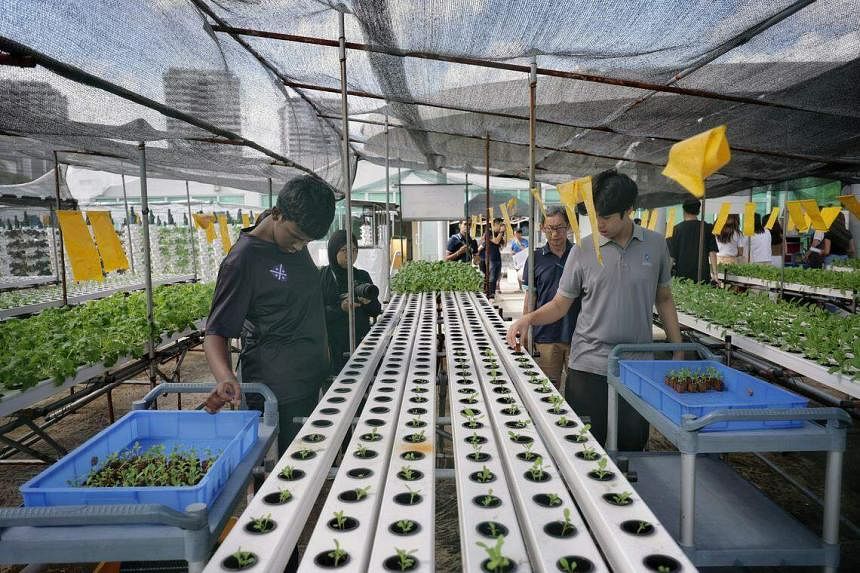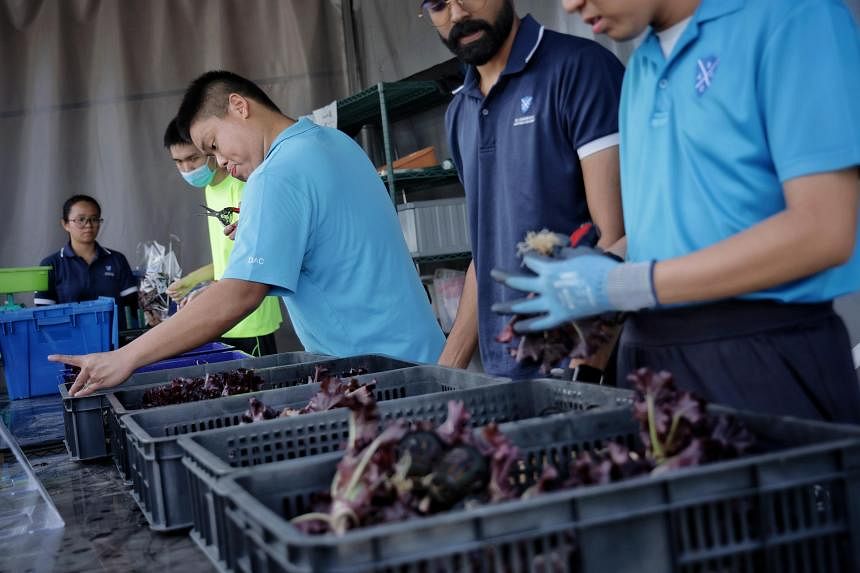SINGAPORE – A vocational training initiative in urban farming for autistic individuals is being turned into a supported employment farm, as part of efforts to help more people find employment after they graduate from special education (Sped) schools.
The programme by St Andrew’s Autism Centre (SAAC) was unveiled at an event by the Autism Network Singapore to mark World Autism Awareness Day on April 2.
The network – comprising SAAC, Autism Association (Singapore), Autism Resource Centre (Singapore), Awwa and Rainbow Centre – is also calling for more schools, companies, community groups and public agencies to work with them to support adults with autism.
The five social service agencies will hold open houses in April for those interested in partnering them to support people with autism. Partners can employ people with autism, purchase goods they produce or donate to the organisations, among other ways to support them.
The free, 1½ hour-long tours will be hosted by the agencies’ senior management.
Those interested can sign up at bit.ly/ansopenhouses2024
Speaking at the event held at SAAC on March 27, president of Autism Resource Centre (Singapore) and chairman of Autism Association (Singapore) Denise Phua said there have been greater efforts to support young people with autism in the last two decades, but not so much for adults with the condition.
Many people with autism who are unable to work stay home and regress after graduating from Sped schools at the age of 18, if they cannot access any support services such as day activity centres (DACs). This problem is known as the “post-18 cliff”.
“From 19 up to 85... that’s a really long time... We must do something about this space, from post-18 up to the time that we pass on,” Ms Phua said.
Around 450 people graduate from Sped schools every year, and about half of them have autism.
Mr Bernard Chew, chief executive of SAAC, which serves those with moderate to severe autism, said caregivers often have to leave their jobs to take care of their grown children in the long wait for a spot in a DAC, which can stretch up to five years.
He said the farm, which is under SAAC’s Dignity of Work programme, offers another option for those unable to get a spot in sheltered workshops and DACs.
Set up in partnership with aquaponics farm BlueAcres, the farm started as a training initiative for SAAC’s DAC clients, and sells produce to restaurants. The plan is for the supported employment farm to start in August with 10 to 12 autistic individuals who will work for about four hours every weekday and be paid every month.
Mr Chew suggested that the supported employment model can be a lower-cost alternative to DACs, to help with long wait times for the latter. He pegged the cost of running a supported employment farm at somewhere between the cost of sheltered workshops and that of DACs.
“If you don’t have sustainable employment for people with moderate autism, that would eventually become demand that will flow back into the DAC – more expensive to fund,” he said.
SAAC also has other vocational training programmes in baking, laundry and craftwork.

“They learn visually, so what we do is to have a set of visual supports for each of the steps,” said Mr Chew, as he took the media on a tour of the rooftop farm at SAAC on March 27.
A communication guide with pictorial cues for gestures such as “open”, “wipe” and “press” also helps job coaches and farm crew to guide people with autism, especially those who are non-verbal.
Mr Alex Ang, 18, a student of St Andrew’s Autism School, joined the SAAC urban farming programme, as his teachers and therapists saw his interest in nature and hands-on activities.
His father, Mr Andrew Ang, said the weekly hour-long sessions at the farm gave his son a sense of purpose. Since joining, he has become more adept at following instructions, managing tasks and working with others. The programme also brought out the teenager’s helpful side in assisting his teacher with collecting vegetables and tidying up the area, he added.
Ms Phua said autism is a complex condition, with many autistic people also having some degree of intellectual disability or epilepsy. Autistic individuals can range from those who are able to live independently to those requiring significant support in their daily lives.
“So we need to build formal models for this work continuum – from not paid, to supported, to fully paid,” she said.
To prepare people with autism for life after school, Rainbow Centre’s social workers help each of its Sped students with transition planning from the age of 15, to connect them with programmes which match their specific strengths, interests and needs.
Rainbow Centre’s three Sped schools see around 90 graduates each year, most of whom have moderate to high support needs, and fewer than 5 per cent qualify for existing employment or vocational programmes.
Ms Tan Sze Wee, the organisation’s executive director, recalled how there was a student who said her dream was to sell nasi padang, like what her mother was doing. But after the school exposed her to a residential arts programme, she told them she wanted to become a singer and dancer instead.
“It really showed to us that if we expose them to different things, their world changes, and they realise that they have other interests and abilities. So it’s really about nurturing that,” said Ms Tan.
Correction note: This article has been edited for clarity.


